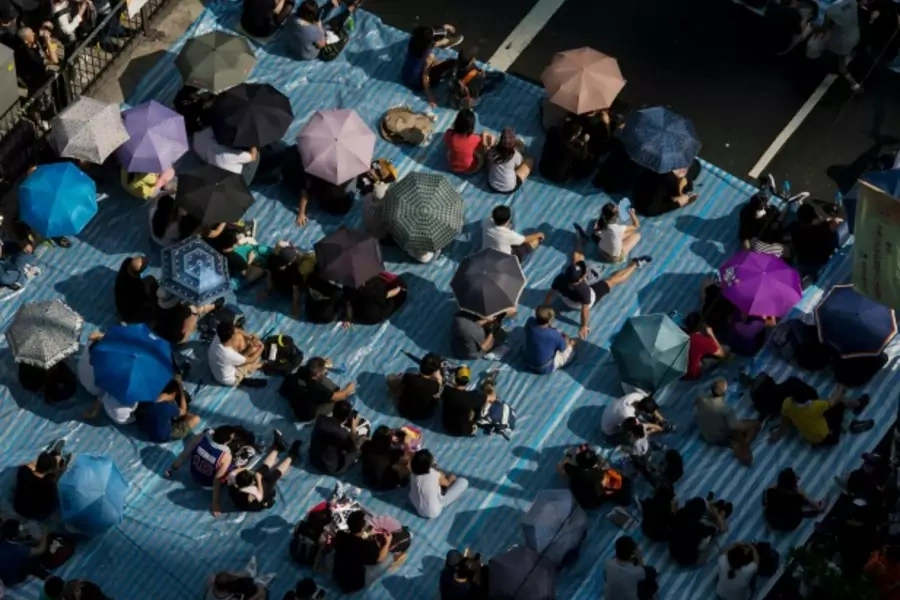Friday Asia Update: Top Five Stories for the Week of October 3, 2014

More on:
Ashlyn Anderson, Lauren Dickey, Darcie Draudt, Andrew Hill, Will Piekos, and Sharone Tobias look at the top stories in Asia today.
1. Pro-democracy protests continue in Hong Kong. Pro-democracy protests have engulfed Hong Kong over the past week, focusing on China’s announcement that candidates for the 2017 election of Hong Kong’s leader will be selected by a pro-Beijing committee. In addition to the right to freely elect the city’s next leader, the demonstrators are demanding the removal of Hong Kong’s current chief executive, Leung Chun-ying, widely seen as Beijing’s lackey. Students, in conjunction with the Occupy Central movement, have staged sit-ins along several of the city’s main thoroughfares; they have been peaceful but faced pepper spray and tear gas from police last Sunday and more recently attacks from government supporters. On Thursday, the protesters agreed to talks with Hong Kong’s second-highest official, but called them off the next day, citing police brutality. News of the protests have been censored in mainland China, and Instagram has been added to a list of blocked social media websites to prevent pictures of the demonstrations from spreading.
2. Indian Prime Minister Narendra Modi wraps up his ‘rock star’ debut in the United States. The prime minister of India arrived in Washington on Monday after a tour of New York, which included a speech at the United Nations General Assembly, a sold-out event with the Indian-American community at Madison Square Garden, an appearance at the Global Citizen Festival, and a speech at the Council on Foreign Relations. Modi had two days of meetings with U.S. President Barack Obama, which culminated in a joint statement and a co-authored article in the Washington Post. Among other things, the two leaders agreed to enhance trade ties and expand cooperation in the areas of maritime security, counterterrorism, nuclear cooperation, space research, and clean energy.
3. Search continues for missing hikers following volcanic eruption in Japan. Mt. Ontake, a popular hiking destination, erupted without warning last Saturday, blasting a hot cloud of ash, rocks, and steam down its slopes at speeds of up to 400 kilometers per hour. As of Thursday night, forty-seven bodies have been recovered and identified, making it Japan’s deadliest volcanic eruption since the Second World War. Around 1,000 police officers, firefighters, and Self-Defense Force troops have been conducting search and rescue operations, but their efforts have been hampered by ongoing tremors, noxious fumes, and deteriorating weather. The eruption has sparked concern elsewhere in Japan about the possibility of other volcanic activity and the consequences it could have on Japan’s recovering nuclear industry. Mt Ontake last erupted in 1979.
4. Australian air force begins support for missions against ISIS in Iraq. Royal Australian Air Force planes have completed their first operational missions this week in Iraq as part of a U.S.-led coalition against Islamic State of Iraq and Syria (ISIS) militants. Prime Minister Tony Abbott initially announced to the Australian parliament that refueling aircraft and a surveillance plane would support operations, but only two days later, the Abbott government approved jet fighter airstrikes and the deployment of special forces to advise and assist Iraqi forces. Increased Australian involvement in the fight against ISIS coincides with Abbott’s efforts to counter domestic terrorist threats through legislation aimed at increasing the powers of the Australian Security Intelligence Organization.
5. Envoy to UN says North Korea open to restart Six Party Talks. So Se Pyong, the North Korean ambassador to the United Nations, said on Thursday his country is open to talking about its nuclear program. While China and Russia are also prepared to restart negotiations, the remaining parties—South Korea, United States, and Japan—are not. So also indicated that North Korea has sought to cooperate with the UN and European Union on human rights issues but has not received any feedback. Earlier this week, U.S. Envoy for North Korea Policy Glyn Davies said North Korea had rebuffed U.S. efforts for closer dialogue on nuclear and human rights issues as well as the three U.S. detainees in North Korea.
Bonus: China ruffles some feathers with full pigeon cavity searches. The Chinese government released 10,000 white pigeons for China’s National Day on Wednesday, but only after they underwent an “anal security check for suspicious objects,” according to a tweet from state-run People’s Daily newspaper. The increased poultry-based security is reportedly related to security fears based on attacks by Uighur minorities throughout China in the past year.
More on:
 Online Store
Online Store